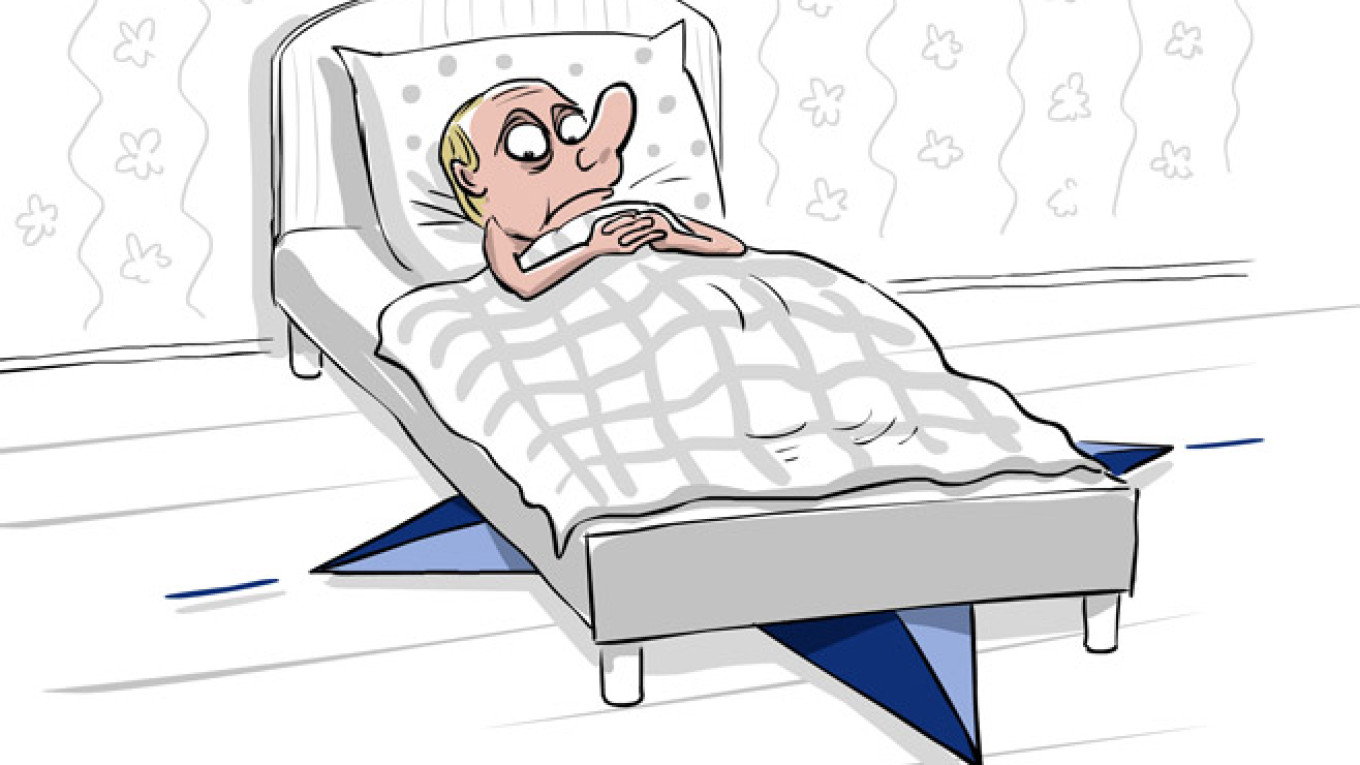President Vladimir Putin appears to have a NATO phobia. He has repeatedly raised the specter of Ukraine joining the alliance, with NATO and U.S. warships using Sevastopol as a port. It is not clear whether he says this simply to justify Russia's illegal seizure of Crimea or whether he actually believes it. If the latter, he should reexamine his premises.
NATO and Russia offer starkly contrasting narratives regarding NATO enlargement. Russian officials say the Alliance violated a pledge not to enlarge to the east and then did so in order to hem in Russia. NATO members respond that they never made such a commitment and that enlargement was driven by the desire of Central European states to join the alliance. The sides will never reconcile their different histories on this point.
The Russian view extrapolates NATO enlargement as now targeted at Ukraine. This requires a reality check.
I write this as one who testified to the U.S. Congress in 2008 that Ukraine merited a NATO membership action plan. Three years after the Orange Revolution, Ukraine had done as much in terms of political, economic and defense reform as countries which received membership action plans in 1999, such as Romania.
But there was — and remains — a clear distinction between a membership action plan and an invitation to join NATO. Ukraine was ready for the former in 2008; it was not ready for the latter. Elite and public support for NATO was low, and the alliance does not invite countries to join if their populations do not support membership.
In a 1999 speech at a Kiev security conference, Volodymyr Horbulin, perhaps Ukraine's wisest strategic thinker, made this point. He expressed appreciation for NATO's "open door" policy as giving Kiev a membership perspective if it someday aspired to join the Alliance. He added, however, that Ukrainian membership would not arise as a serious question unless and until a public consensus formed in favor of such a course. That consensus has not existed and does not exist today.
Indeed, virtually no Ukrainian foreign policy would provoke sharper disagreement within the country than a bid to join NATO or seek a membership action plan. President Petro Poroshenko has ruled that out, which undoubtedly reflects his understanding that a pro-NATO course would severely hinder his effort to mend divisions with eastern Ukraine.
Another reason why Putin should not worry about the possibility of Ukraine joining NATO is that the alliance has no appetite for it. In 2008, the German and French leaders, among others, rebuffed intense lobbying by George W. Bush in favor of a membership action plan for Ukraine.
Does Putin believe those views have changed? Especially now, when Russia's occupation of Crimea would mean that bringing Ukraine into NATO would entail bringing into the Alliance a raw and festering territorial dispute?
NATO's 1995 enlargement study noted that resolution of territorial disputes "would be a factor in determining whether to invite a state to join the Alliance." NATO seeks to avoid the sort of situation in which a country might join and then immediately present NATO allies with an Article 5 contingency — Article 5 of the NATO charter pledges allies to treat an attack on one as an attack on all.
NATO membership for Ukraine is off the table until such time as, first, public attitudes change hugely within Ukraine and, second, all NATO member states — since the Alliance operates on consensus — are ready to extend a security guarantee backed by a willingness to use military force to defend Ukraine, including against Russia.
And neither of these two developments is likely to occur any time soon.
In any case, the belief that the U.S. intended to use Sevastopol as a naval base simply ignores facts about the U.S. Navy. Sevastopol is a splendid natural harbor, to be sure. But consider the main areas of operation for U.S. warships: the western Pacific and Persian Gulf. Sevastopol is a great distance from either, and those operations are already supported by bases in Hawaii, Guam, Japan, Singapore and Bahrain.
Putin should ask the Russian military how much time the U.S. Navy has spent in the Black Sea in recent years, prior to the Ukraine crisis. Given the many demands on U.S. warships, the Navy for most of the past 15 years has treated the Black Sea as something of a backwater.
In reexamining his premises about NATO and Ukraine, Putin might also ask why so many Central European states have sought to join NATO. Or, if he proceeds from the Russian view that NATO pressed them to join, he might ask why they so eagerly said yes.
Former Warsaw Pact members and the Baltic states joined because they saw NATO as a means to underpin their security. But to underpin their security against threats from whom? Not Sweden. Nations like Poland and Latvia joined NATO because of concern about Russia. And, unfortunately, Russian behavior over the past several months would seem to validate those fears.
Steven Pifer, a senior fellow at the Brookings Institution, is a former U.S. ambassador to Ukraine.


